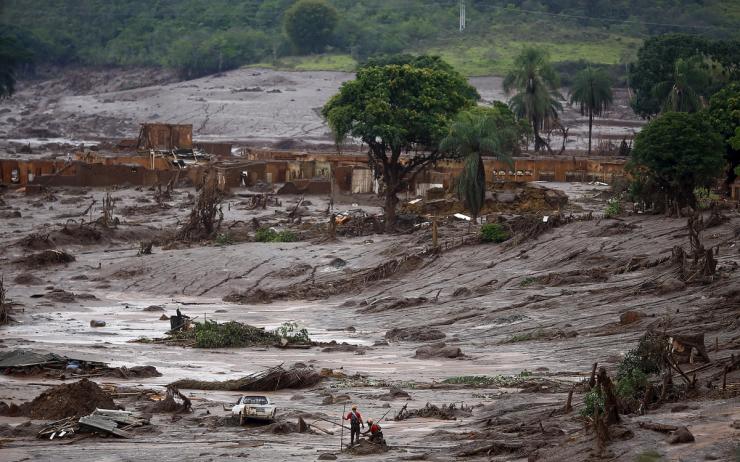The News
A closely watched trial set to open this month in London that pits some 700,000 plaintiffs against an international mining giant encapsulates — and could amplify — pressure on global companies over their environmental records.
Brazilian claimants want the Anglo-Australian mining giant BHP to compensate them for losses they suffered in the deadly 2015 collapse of a dam part-operated by the company in Brazil. The case is being financed by a Connecticut hedge fund, which has backed the effort with a $550 million secured loan.
It is the highest-stakes effort yet by foreign plaintiffs to try class-action-style cases in England against London-listed companies with operations spanning the globe, and highlights how the prospect of hefty returns is enticing deep-pocketed investors to fund the efforts.
“For future potential climate disputes… there is a legal pathway,” Ana Carolina Salomão, chief investment officer at Pogust Goodhead, the London law firm representing the plaintiffs, said in an interview, “to seek justice on a global scale related to a problem that is global.”
In this article:
Know More
The London case centers around the 2015 collapse of a dam at an iron mine near the Brazilian city of Mariana, which resulted in a flood of toxic residue, ultimately killing 19 people and leaving hundreds homeless, while engulfing nearby forests and polluting a river.
In the years that followed, more than 700,000 Brazilians, local governments, and businesses banded together to sue BHP and Vale, as well as their joint venture Samarco, over the disaster, initially filing suit in London in 2018. On Oct. 21, an English court will begin assessing the two companies’ liability in a trial expected to last through March. (Separate legal action is also underway in Brazil, with the country’s government confirming last month that it was negotiating a potential $18 billion payout from the miners.)
In separate statements, BHP and Vale said they were committed to addressing the damage from the dam disaster, adding they had spent about $7 billion in compensation so far. BHP described the dam disaster as “a tragedy that never should have happened,” but both voiced opposition to the case being heard in the UK, which BHP said “duplicates and harms remedial efforts already ongoing in Brazil.”
The London case is notable for reasons beyond the trial itself, though.
For one, it is by some measures the biggest legal action of its kind yet seen in England, where class action-like efforts have long been rare. That has changed as a result of new rules, which initially opened up the possibility of such legal action in antitrust and competition cases.
More importantly, global money managers are looking to fund these kinds of efforts, a step change in environmental litigation that had long been the preserve of impact-focused NGOs. Campaign groups have had huge wins, notably successfully suing Shell in the Netherlands, resulting in a Hague court demanding in 2021 that the global oil and gas giant slash its carbon emissions. But similar legal efforts have been held back, campaigners and lawyers say, for lack of the huge cash reserves required to mount lawsuits against major companies: The Australian Financial Review estimated in August, for example, that the Mariana dam trial could result in £350 million ($465 million) in legal fees.
Enter the field of litigation finance, in which investors front cash to litigants and take a cut of the payouts. The sector has historically been the province of hedge funds backing corporate contract disputes, patent rights, or international arbitration, where settlements can be vast.
Now, cash is going to environmental litigation. Those Semafor interviewed said variously that they wanted to help claimants — often poor people who lack the resources or know-how to mount legal action — and in so doing, send a broader signal to companies to shape up.
But all highlighted the potentially eye-watering payouts on offer: One Sydney-based firm has touted returns of 165% on a fund it is positioning as an “ESG asset.”
“The reason we like litigation finance is because the impact focus is really, really large,” said Robert Schultz, a partner at Capricorn Investment Group, which has put money into Aristata Capital, a London-based firm that finances litigation cases focusing on the environment, climate change, and human rights. He added: “The best part about litigation strategies is it’s a very high return combined with a significant impact… There are some very large, outsized returns.”
Indeed, Aristata’s first fund targeted a 20% annual return to investors, “as well as the opportunity to make a positive difference,” the firm’s founder Robert Ryan said, with a second fund due to be launched in early 2025.
In the case of the Mariana dam case, Pogust Goodhead is relying on a $552.5 million secured loan from the hedge fund Gramercy, which the two firms said is the “largest of its kind in a UK-based law firm,” and will be used to progress the Brazil litigation, as well as litigation against more than a dozen carmakers over the Dieselgate scandal. (Gramercy did not respond to requests for an interview.)
Prashant’s view
The consequences of an eventual ruling in the Mariana dam trial due to be heard in London could be enormous.
Campaigners often complain that governments and businesses are not held to account for their role in environmental disasters, or for their impact on climate change, and have increasingly resorted to the courts to force the issue: In Montana and Switzerland, individuals have successfully sued their own governments for not doing enough, for example. And climate litigation writ large has been increasing, the London School of Economics’ Grantham Research Institute said in a June report.
But suing major corporations has proved harder: Many carry out their international operations with domestic subsidiaries or in joint ventures with local partners, and the oil-and-gas and mining sectors in particular operate in countries with flimsy judicial systems. Linking the subsidiary’s actions to the parent company headquartered in London or New York has been difficult.
Successfully suing BHP in London for actions taken across the Atlantic would mark a huge shift, in effect serving notice to companies listed on the British capital’s stock exchange that their global operations and subsidiaries are fair game: Much of the corporate world is watching.
“Companies that previously ignored ESG must now pay attention to it,” Oliver Browne, a London-based partner in the complex litigation and arbitration practice at the law firm Paul Hastings, told me. “You now need to be more careful than ever… because litigation is more likely to occur than ever.”
Room for Disagreement
The London case is not without opponents, whose criticism coalesces around two issues: the jurisdiction and the financing.
On the former, a Brazilian mining trade group has argued that the inclusion of municipalities in the London class action in particular undermines Brazil’s sovereignty, saying such cases “create legal uncertainty, harm the business environment, and the Brazilian economy.” On the latter, business groups have voiced frustration over the involvement of international financial firms in what they regard as domestic disputes: One trade association said global litigation funders were filing sometimes “spurious class action claims,” the Australian Financial Review reported in April.
And even if the Pogust Goodhead lawsuit is successful, Salomão herself acknowledged that NGOs would still likely remain at the forefront, with private capital unlikely to test the boundaries or take the risks that philanthropic funds were willing to take on when it comes to transnational climate litigation.


